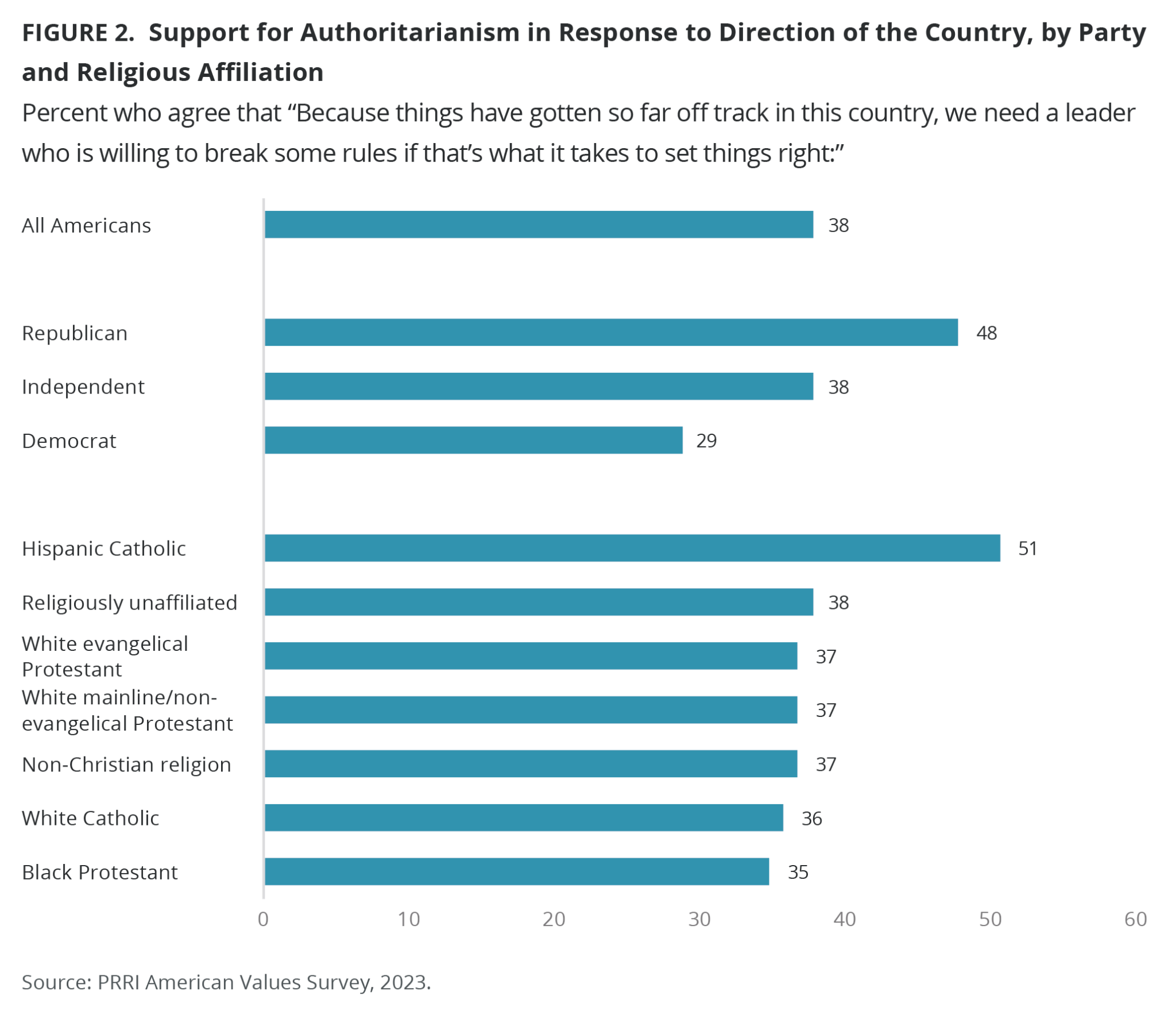Today’s Lineup
Today, I share articles about why we need to take seriously what Trump is promising for a second term, how America is killing its mothers through the criminalization of pregnancy outcomes, why we should be concerned that Speaker Mike Johnson is an Article V Constitutional Convention advocate, how law enforcement agency abuse of A.I. is leading to wrongful arrests and convictions, the behind-the-scenes story of Brittney Griner’s release from Russia through a prisoner swap, the importance of Cold War pop culture, and award-winning landscape photographs.

#1
A Warning (Jeffrey Goldberg, The Atlantic)
There was a time when it seemed impossible to imagine that Trump would once again be a candidate for president. That moment lasted from the night of January 6, 2021, until the afternoon of January 28, 2021, when the then-leader of the House Republican caucus, Kevin McCarthy, visited Trump at Mar-a-Lago and welcomed him back into the fold.
And so here we are. It is not a sure thing that Trump will win the Republican nomination again, but as I write this, he’s the prohibitive front-runner. Which is why we felt it necessary to share with our readers our collective understanding of what could take place in a second Trump term. I encourage you to read all of the articles in this special issue carefully (though perhaps not in one sitting, for reasons of mental hygiene). Our team of brilliant writers makes a convincingly dispositive case that both Trump and Trumpism pose an existential threat to America and to the ideas that animate it. The country survived the first Trump term, though not without sustaining serious damage. A second term, if there is one, will be much worse.
WHY I FIND IT INTERESTING:
I have complained in this space about how far too many reporters and media outlets have failed to take seriously the danger of a second Trump term to the future of our democracy. Trump’s rhetoric has taken an increasingly authoritarian and fascist turn in recent months. Pro-Trump think tanks have created transition plans to ensure there are no so-called “adults” left to push back against MAGA demands. So, I wanted to credit Jeffrey Goldberg and The Atlantic’s writing team for putting together a special issue examining what Trump 47 would mean. The issue covers the potential impact on our democracy, domestic policy, foreign policy, and culture. I encourage every person to take the time to read through these stories to see just what the stakes are as we enter another presidential election year. I hope it won’t be the last competitive one.
Things I Find Interesting is a reader-supported publication. To receive new posts and support my work, consider becoming a free or paid subscriber.
#2
10 alarming things Trump has promised to do in a second term (Judd Legum and Rebecca Crosby, Popular Information)
Here’s the truth: No one will know who the next president will be until November 5, 2024. Save yourself some time and ignore the chatter.
Unlike a horse race, the outcome of the 2024 presidential election will impact the lives of hundreds of millions of people in the United States and billions of people around the world.
The presidential election will likely be decided by people who, today, have not made up their minds about who to support in 2024. For many of these swing voters, their decision will hinge on their expectation of what Trump will do in a second term. Of course, we don’t know everything that will happen in a potential Trump second term. But Trump and his allies have made their intentions clear on a range of key issues.
WHY I FIND IT INTERESTING:
Former President Trump and his supporters are doing us a favor by sharing their authoritarian plans before the election. As the recent election in Argentina demonstrates, out-of-office authoritarians often soft-peddle their real intentions until they take power. Whether it is how Trump refuses to deny his ambitions to be a dictator, sharing his plans to turn the Justice Department against his opponents, or announcing how he will suspend the nation’s refugee program and bar Muslims from entering the country, the former president is not being subtle. We need to take Trump seriously. These are not exaggerations. They are promises. We need to share them and take them seriously. This list from Legum and Crosby is a worthwhile place to start.
#3
Lines in the sand (Radley Balko, The Watch)
These last several months have made it clear that it’s time to draw some lines in the sand. So below, I’ve put together a list of questions that those of us concerned about the state of democracy in this country should pose to anyone who wields or seeks to wield power. These questions are clearly designed for people seeking political power, but it needn’t be limited to them. To be successful, a Trump authoritarian push would need support not just from politicians, but from advocacy groups, civic organizations, law enforcement, judges, clergy, non-political election officials, and others. So these questions could also be directed at people who lead lobbying groups or think tanks, editors of newspapers and magazines, TV producers, heads of civic organizations, and those who want to run law enforcement agencies.
Conceiving of and writing out these questions at times made me question my own sanity. Some are so dystopian that they seem hyperbolic, hysterical, or completely detached from reality. I suspect reading them will have the same effect. It’s hard to fathom that we’re living in a time when they’d need to be asked. Yet each of these questions is based on actual statements from Trump or one or more of his influential supporters.
WHY I FIND IT INTERESTING:
Balko has done a great service by creating this list of questions to ask people who support Donald Trump’s candidacy to see if they agree with the authoritarian promises he has been making since beginning his campaign for a second term. It would be great if reporters would ask these questions of Trump and his surrogates. But, as Balko notes, we don’t have to rely solely on the media to get these questions on the agenda. Balko’s first question sets the tone: “A number of Trump supporters—including Ohio Sen. J.D. Vance—have argued that we need an “American Caesar,” a dictator who will dispense with the democratic norms that they believe is holding the country back. And they have suggested that Trump is the man for the job. Let’s set aside their historical ignorance about what Ceasar actually did and concede their view of Caesar as a benevolent populist dictator. Do you agree with them? Does America need a dictator?” It may be difficult to believe, but Balko’s questions continue for pages—and become ever more troubling. It’s time to get people on the record with their answers.
#4
America is killing its mothers (Lyz Lenz, Men Yell at Me)
In Ohio, a woman is being charged with a felony after suffering from a miscarriage. Brittany Watts, a 33-year-old Black woman, had a miscarriage at week 22 of her pregnancy. The fetus came out through the birth canal and into the toilet. Despite medical evidence that the fetus was non-viable, prosecutors still pressed for the felony “abuse of a corpse” charge.
At the hearing, forensic pathologist Dr. George Sterbenz testified, “This fetus was going to be non-viable. It was going to be non-viable because she had premature ruptured membranes — her water had broken early — and the fetus was too young to be delivered.” Despite that evidence, assistant prosecutor for Warren County Lewis Guarnieri argued that because Watts left the fetus in the toilet she should be charged with felony abuse of a corpse. On November 2, a judge allowed that charge to move forward, saying, “There are better scholars than I am to determine the exact legal status of this fetus/corpse/body/birthing tissue/whatever it is.”
Watts is just one of many mothers fighting for their right to autonomy under a spate of new abortion restrictions.
WHY I FIND IT INTERESTING:
Writers and reporters like Lenz and Abortion, Every Day’s Jessica Valenti have been warning about the dangers pregnant people face under the abortion bans Republican states have enacted since the Supreme Court’s Dobbs decision. Each week brings us new stories about how Republicans and forced-birth advocates are seeking to criminalize pregnancy outcomes. The prosecution of Brittany Watts also demonstrates how prosecutors will target lower-income people and people of color. As Lenz writes, “Recently, in a moment of frustration, I texted a friend who works in healthcare to ask, “Do women have to die for people to care about how bad it’s getting?” And my friend responded, “Women are already dying, but they’re the lives we are okay with overlooking.” Donald Trump and the Republican Party created this situation. A nationwide ban is coming if the Republicans win in 2024. It’s another reason we need to focus on this election’s stakes.
Thank you for reading Things I Find Interesting. This post is public so feel free to share it.
#5
Woman charged with child neglect for medical marijuana during pregnancy (Jessica Valenti, Abortion, Every Day)
You’re going to love this. And by love, I mean absolutely hate: In Oklahoma, prosecutors have been arresting women they say used marijuana during their pregnancies—charging them with child neglect. One of those women is 27 year-old Brittany Gunsolus, who used edibles and topical creams during her pregnancy with a recommendation from her doctor.
Gunsolus’ baby was born healthy, and child welfare workers found her home to be safe and loving—yet the district attorney of Comanche County decided to bring her up on felony child neglect charges. The Frontier reports that when Gunsolus’ lawyers pointed out that medical marijuana is the same as any other legal medication, the prosecutor responded that “Gunsolus broke the law because her unborn child did not have its own, separate state license to use medical marijuana.” Yes, really.
WHY I FIND IT INTERESTING:
Is this an example of the “compassion” or “consensus” about abortion that certain Republican politicians are trying to make us believe? Only if we fall for the scam. Valenti does amazing work highlighting these stories before the national media finds them. Republicans have had an extreme position on abortion for decades now. I hope voters continue to hold them to account for the natural outcomes their forced-birth policies create. I also hope the Oklahoma courts exercise better discretion than some of their District Attorneys.
#6
Inside Mike Johnson’s Ties to a Far-Right Movement to Gut the Constitution (Laura Jedeed, Politico Magazine)
As the interregnum without a speaker of the House came to an end last month, people from across the political spectrum came together, in a rare show of unity, to ask a single question: Who in the world is Mike Johnson? But amidst the general bewilderment, one group of conservative evangelicals with a radical cause immediately recognized the new speaker’s name.
For the last 10 years, the “Convention of States” movement has sought to remake the Constitution and force a tea party vision of the framers’ intent upon America. This group wants to wholesale rewrite wide swaths of the U.S. Constitution in one fell swoop. In the process, they hope to do away with regulatory agencies like the FDA and the CDC, virtually eliminate the federal government’s ability to borrow money, and empower state legislatures to override federal law.
WHY I FIND IT INTERESTING:
I have shared my deep concerns about Governor Gavin Newsom’s (D-CA) proposal to enact needed gun safety regulations using the Article V Constitutional Convention process. I didn’t know then that the House Republicans would replace Speaker Kevin McCarthy with a national leader of the conservative Convention of the States movement. While Newsom argues that it is possible to restrict an Article V Constitutional Convention to a single subject, I find the arguments of Constitutional scholars and organizations like Common Cause explaining why such restrictions won’t bind delegates compelling. After all, our nation has experience with such a dynamic—most delegates to the 1787 Constitutional Convention thought they were attending a Federal Convention to update the Articles of Confederation and not heading to Philadelphia to create a new system of government. Is an Article V Constitutional Convention more likely to lead to national gun safety laws or the gutting of the First and Fourteenth Amendments and a Balanced Budget Amendment? Conservatives and Christian Nationalists have been planning for an Article V Convention for decades. The risks of what could be lost are too high to take this chance.
#7
Does A.I. Lead Police to Ignore Contradictory Evidence? (Eyal Press, The New Yorker)
Advocates of facial-recognition technology acknowledge that the quality of the algorithms varies greatly, but they contend that the best ones do not have such demographic imbalances. They also note that, among the millions of searches that have been conducted by police, only a few have been proved to lead to wrongful arrests. But how many people have been erroneously identified without the mistake being recognized? Nobody can say, in part because the technology is poorly regulated and the police’s use of it is often not shared with either the public or the accused. Last fall, a man named Randal Quran Reid was arrested for two acts of credit-card fraud in Louisiana that he did not commit. The warrant didn’t mention that a facial-recognition search had made him a suspect. Reid discovered this fact only after his lawyer heard an officer refer to him as a “positive match” for the thief. Reid was in jail for six days and his family spent thousands of dollars in legal fees before learning about the misidentification, which had resulted from a search done by a police department under contract with Clearview AI. So much for being “100% accurate.”
Law-enforcement officials argue that they aren’t obligated to disclose such information because, in theory at least, facial-recognition searches are being used only to generate leads for a fuller investigation, and do not alone serve as probable cause for making an arrest. Yet, in a striking number of the wrongful arrests that have been documented, the searches represented virtually the entire investigation. No other evidence seemed to link Randal Reid, who lives in Georgia, to the thefts in Louisiana, a state he had never even visited. No investigator from the Detroit police checked the location data on Robert Williams’s phone to verify whether he had been in the store on the day that he allegedly robbed it. The police did consult a security contractor, who reviewed surveillance video of the shoplifting incident and then chose Williams from a photo lineup of six people. But the security contractor had not been in the store when the incident occurred and had never seen Williams in person.
WHY I FIND IT INTERESTING:
It does not take much effort to find instances of the police misusing technology to put innocent people in jail. We should always be concerned about how bad processes can lead to false accusations and convictions. Artificial Intelligence has been shown to have significant biases against people of color. Plus, as the Innocence Project argues, it is one of the tools that can lead to an unconscious bias in identifying suspects because investigators seek to confirm the technology’s results and ignore conflicting evidence. Press’ article explores how the police use facial recognition technology as a shortcut without following the safeguards required to prevent these horrible mistakes. The stories Press shares of people falsely arrested because of the misuse of this technology and police misconduct are chilling. We need more protections urgently.
#8
Getting Griner Out: The inside story of her arrest, detainment and release from Russia (T.J. Quinn, ESPN)
The next day — Dec. 8, 2022 — Bout and Griner met on an airport tarmac in Abu Dhabi in the United Arab Emirates, each escorted by officials from the other’s country. For Bout, once described by the U.S. Justice Department as one of the most prolific arms dealers in the world, the swap ended 14 years in custody. For Griner, it meant the WNBA star would return home after being held nearly 10 months in Russia on drug charges. Her case spurred political and social outpourings, and unprecedented global attention to the cause of wrongful detainees.
During those 10 months, Griner and Bout knew little about the machinations that would lead to their eventual meeting, other than scant details shared by diplomatic officials and their own lawyers. The public heard even less.
WHY I FIND IT INTERESTING:
T.J. Quinn has written a comprehensive story describing the events and negotiations that led to the prisoner swap between the United States and Russia that freed WNBA and U.S. Women’s Basketball Team star Brittney Griner last year. He spoke to people—including several who worked closely with the Biden Administration—about the details of the start-and-stop negotiations. While Griner declined the chance to comment directly, we hear from her friends and supporters. Quinn also speaks to Victor Bout, the convicted arms dealer whom Russia demanded in exchange for Griner. We learn about the strategies Griner’s advocates used to involve the White House and the public in advocating for her release. It was not an easy job. This article is a long read, but it is one as compelling as many spy novels I’ve read.
#9
When Hollywood Put World War III on Television (Tom Nichols, The Atlantic)
In the end, we got through 1983 mostly by dumb luck. If you’d asked me back then as a young student whether I’d be around to talk about any of this 40 years later, I would have called the chances a coin toss.
But although we might feel safer, I wonder if Americans really understand that thousands of those weapons remain on station in the United States, Russia, and other nations, ready to launch in a matter of minutes. The Day After wasn’t the scariest nuclear-war film—that honor goes to the BBC’s Threads—but perhaps more Americans should take the time to watch it. It’s not exactly a holiday movie, but it’s a good reminder at Thanksgiving that we are fortunate for the changes over the past 40 years that allow us to give thanks in our homes instead of in shelters made from the remnants of our cities and towns—and to recommit to making sure that future generations don’t have to live with that same fear.
WHY I FIND IT INTERESTING:
The Atlantic staff writer Tom Nichols retired as a U.S. Naval War College professor last year. In articles and tweets, he has shared how he taught a class about Cold War pop culture that I wish I could have observed. After all, as an Air Force child who lived on or adjacent to military bases from birth until 1996, I lived a bunch of it. Nichols wrote this newsletter to commemorate the 40th anniversary of one of the Cold War’s most important cultural moments: the night ABC aired The Day After. The movie dramatized a nuclear exchange between the Soviet Union and the United States—and its aftermath. In this piece, Nichols provides the context for the extremely tense situation we faced when the television movie aired in 1983. Frankly, I think it is remarkable our species survived that year. Yuri Andropov had just taken over the Soviet Union after Leonid Brezhnev’s death in November 1982. As relations soured, U.S. President Ronald Reagan gave his “Evil Empire” speech in March 1983. The Soviet military shot down Korean Air Lines Flight 007 in September. Later that month, Soviet Lt. Colonel Stanislav Petrov determined that the country’s early warning system was falsely reporting a massive United States nuclear launch and prevented a near-certain Soviet nuclear launch. On October 23, the U.S. Marine barracks in Beirut was attacked by a bomber, killing 241. The U.S. invaded Grenada on October 25. On November 7, the U.S. and NATO began an extensive war exercise, Able Archer. We subsequently learned how the Soviets believed the exercise was actually part of the preparations for a surprise attack thanks to the double agent Oleg Gordievsky’s efforts to warn his United Kingdom handlers. (Ben Macintyre’s book, The Spy and the Traitor, is an entertaining and informative review of Gordievsky’s career and how the United Kingdom helped him to escape after traitor Aldrich Ames exposed his identity to the Soviets.) The Day After aired on November 20. Yeah, it was a tense time. Nichols shares some other movies, like Threads, which are even more scary. (One viewing was enough for me.) I also want to send a shout-out to Countdown to Looking Glass, a movie that aired on HBO in October 1984. That movie is a dramatization, primarily through news reports, showing how a minor incident in the Persian Gulf could escalate into a nuclear confrontation based on a war game simulation. I watch it about once a year (it’s available on YouTube) because I am a mark for shows that dramatize the news. I worry quite a bit about the ramifications of having many active nuclear weapons online as the global political situation deteriorates. I hope my children don’t have to experience what we did during the Cold War, but the global rise of authoritarianism leaves me with rising apprehension. We have quite a bit of work to do.
The Closer
After all that, I’ll leave you with the encouragement to take a look at the winners of the 2023 Natural Landscape Photography Awards. Seeing what happens when talented people capture our planet’s natural beauty inspires me. I hope you will find it encouraging as well.
Post-Game Comments
Today’s Thought from my Readwise collection:
“History can be erased in ways other than by force of arms. It can be erased by accumulated myth. It can be erased by layer after layer of stony denial. And it can be erased by popular consensus, tacit or otherwise. But history erased is history weaponized, and it will have its day, one way or the other, until it is accorded the respect it is due.” (Charles P. Pierce, The Rough Beast Began Stirring Again)
Thank you for reading Things I Find Interesting. This post is public so feel free to share it.
Thank you for reading my newsletter. Let me know what you think about what you’ve read. Send me things you’ve found interesting! You can email me at craigcheslog@substack.com.
Please help me spread the word about this newsletter by sharing this post via email or on the social media network of your choice. And if you haven’t already, please consider signing up for a free or paid subscription.









